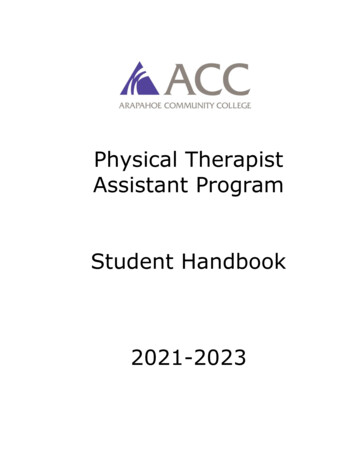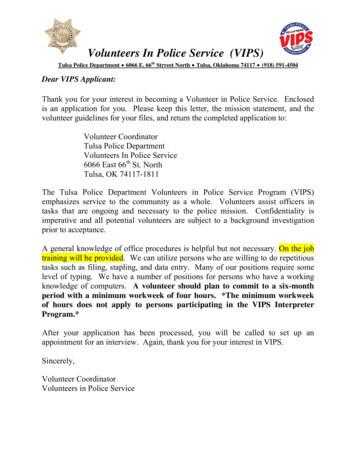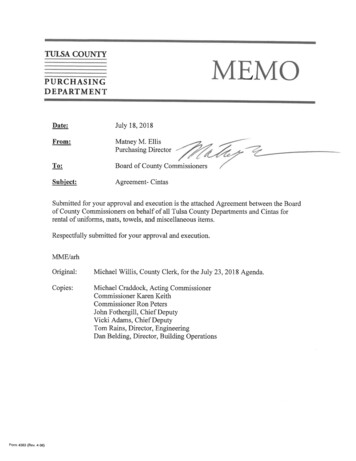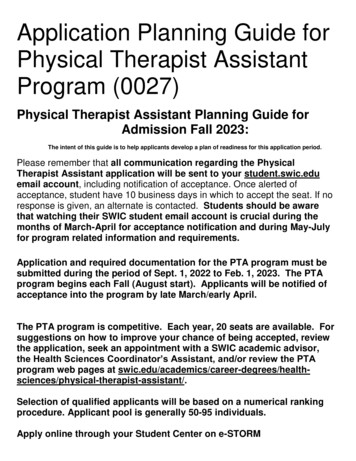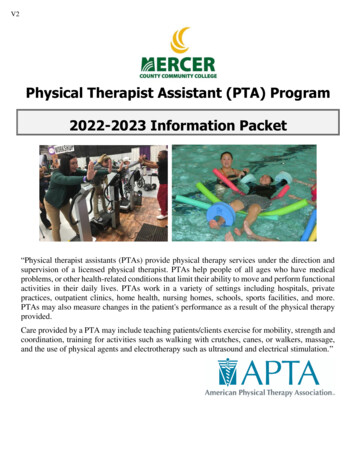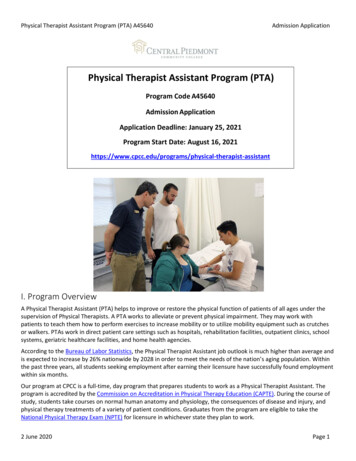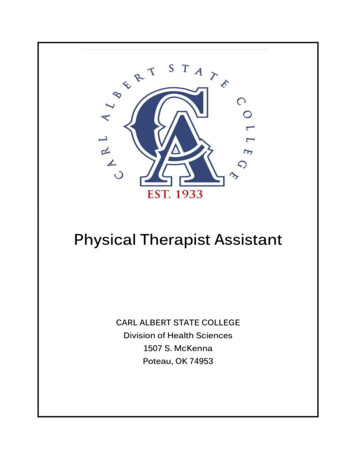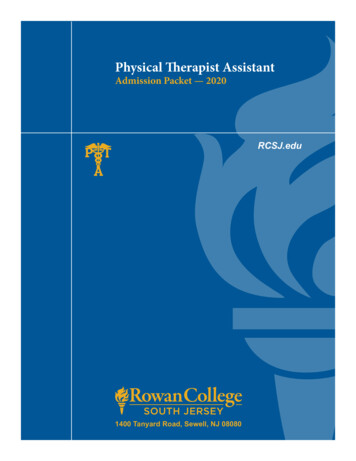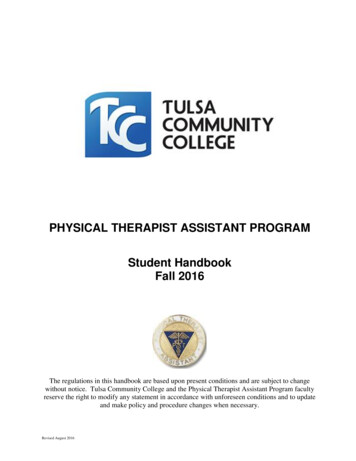
Transcription
PHYSICAL THERAPIST ASSISTANT PROGRAMStudent HandbookFall 2016The regulations in this handbook are based upon present conditions and are subject to changewithout notice. Tulsa Community College and the Physical Therapist Assistant Program facultyreserve the right to modify any statement in accordance with unforeseen conditions and to updateand make policy and procedure changes when necessary.Revised August 2016
TABLE OF CONTENTSSECTION A - GENERAL INFORMATIONIntroductionDefinition and Utilization of the PTAProgram PhilosophyPTA Program Mission Statement, Goals & OutcomesAccreditation, TCC PoliciesCollege Support Servicespage45679SECTION B - CURRICULUMCurriculum PatternCourse DescriptionsCourse Enrollment SequenceCourse Credit9101313SECTION C - STUDENTS RIGHTS AND RESPONSIBILITIESLiability InsuranceStudent Health and Physical ConditionGeneric AbilitiesAttendance and TardinessConduct and BehaviorStudent AppearanceSafetyConfidentialityAccess to Clinic / LaboratoryAccess to LockersStudent EmailStudent PerformanceProgress/CounselingWithdrawalProbation/ DismissalStudent 30SECTION D - GRADUATION, LICENSURE AND APTA MEMBERSHIPGraduate follow upLicensurePhysical Therapy Association MembershipInformed ConsentEssential Functions3030313235Revised August 2016 2
INTRODUCTIONThis handbook was developed as a guide to policies and procedures to aid students enrolled inthe Tulsa Community College Physical Therapist Assistant Program. The Physical TherapistAssistant faculty welcomes recommendations for changes from administration, academic andclinical faculty and students. However, the Physical Therapist Assistant faculty members reservethe right to update and make policy and procedural changes when necessary.Melanie Heffington, PT, DPT, APTA ELI FellowCarla Hinkle, PTA, MSRevised August 2016Vicki Jurries, PTA, MAJeff Hammontree, PT, MS, PCS 3
DEFINITION AND UTILIZATIONOF THE PHYSICAL THERAPIST ASSISTANTDefinitionThe physical therapist assistant is a technically educated health care provider who assists thephysical therapist in the provision of physical therapy. The physical therapist assistant is agraduate of a physical therapist assistant associate degree program accredited by the Commissionon Accreditation in Physical Therapy Education (CAPTE), 1111 N. Fairfax St., Alexandria, VA22314, 703.706.3245, email: accreditation@apta.org, http://www.capteonline.orgThe graduates of this program receive an Associate in Applied Science degree and are eligibleto apply for the licensure examination in Oklahoma or any other state of their choosing. Questionsregarding the licensure examination should be directed to the Oklahoma Board of MedicalLicensure and Supervision at 405.848.6841 orhttp://www.okmedicalboard.org/UtilizationThe physical therapist of record is the person who is directly responsible for the actions of thephysical therapist assistant. The physical therapist assistant may perform physical therapyprocedures and related tasks that have been selected and delegated by the supervising physicaltherapist. Where permitted by law, the physical therapist assistant may also carry out routineoperational functions, including supervision of the physical therapy aide and documentation oftreatment progress. The ability of the physical therapist assistant to perform the selected anddelegated tasks shall be assessed on an ongoing basis by the supervising physical therapist. Thephysical therapist assistant may modify a specific treatment procedure in accordance with changesin patient status within the scope of the established treatment plan.The physical therapist assistant must work under the direction and supervision of the physicaltherapist in all practice settings. When the physical therapist and the physical therapist assistantare not within the same physical setting, the performance of the delegated functions by theRevised August 2016 4
physical therapist assistant must be consistent with safe and legal physical therapy practice andshall be predicated on the following factors: complexity and acuity of the patient's needs;proximity and accessibility to the physical therapist; supervision available in the event ofemergencies or critical events; and type of setting in which the service is provided. When thephysical therapist and the physical therapist assistant are not continuously within the samephysical setting, greater emphasis in directing the physical therapist assistant must be placed uponoral and written reporting.When supervising the physical therapist assistant in any off site setting, the followingrequirements must be observed:1. A qualified physical therapist must be accessible by telecommunications to the physicaltherapist assistant at all times while the physical therapist assistant is treating patients.2. The initial visit must be made by a qualified physical therapist for evaluation of the patient andestablishment of a plan of care.3. There must be regularly scheduled and documented conferences with the physical therapistassistant regarding patients, the frequency of which is determined by the needs of the patient andthe needs of the physical therapist assistant.4. In those situations in which a physical therapist assistant is involved in the care of a patient, asupervisory visit by the physical therapist will be made:a. Upon the physical therapist assistant's request for a reevaluation, when a change intreatment plan of care is needed, prior to any planned discharge, and in response to achange in the patient's medical status.b. At least once a month, or at a higher frequency when established by the physicaltherapist, in accordance with the needs of the patient.c. A supervisory visit should include:1. An on-site re-assessment of the patient.2. On-site review of the plan of care with appropriate revision or termination.3. Assessment and recommendation for utilization of outside resources.PROGRAM PHILOSOPHY AND GOALS.Allied Health Services Division MissionThe TCC Allied Health Services is a learner-centered division synergized through thecollaboration of students, faculty, staff, administration, and stakeholders with a common goal ofpreparing uniquely qualified personnel who will meet the challenges of the complex and everchanging health care delivery system and remain responsive to the communities we serve.Physical Therapist Assistant Program PhilosophyThe Tulsa Community College Physical Therapist Assistant Program is based upon the conceptthat quality education through a balanced variety of learning experiences will enhance anindividual's potential to achieve personal satisfaction and contribute to society. Toward this end,the purpose of this program is to provide the individual desirous of assisting in the practice ofphysical therapy, opportunities to acquire the skills necessary to function successfully as aphysical therapist assistant.Revised August 2016 5
Physical Therapist Assistant Program Mission StatementThe Physical Therapist Assistant Program will produce entry-level practitioners who areeligible for licensure as physical therapist assistants, perform safe and ethical interventions underthe direction and supervision of a physical therapist, and possess background knowledge andskills which will serve as the foundation for further development of technical expertise andunderstanding of the overall health context in which they perform.Program GoalsThe TCC PTA Program will:1. Prepare graduates to effectively demonstrate and apply intra-professional and interprofessional collaborative practices as a part of the health care team.2. Prepare graduates to identify and appreciate the principles and importance of evidencebased practice in physical therapy and the broader health care environment.3. Prepare graduates who demonstrate social responsibility as a part of the physical therapyprofession by meeting the health needs of the underserved in surrounding communitiesthrough service in the TCC Nate Waters PT Clinic.4. Successfully prepare graduates for the NPTAE as evidenced by an 85% first time passrate.5. Prepare graduates as seekers of knowledge, who recognize the lifelong pursuit ofknowledge, skills, abilities, and professional behaviors in effort to deliver effective andcontemporary patient care.Student Achievement Measures1. Employment rate goal per CAPTE2. Graduation Rate goal per CAPTE3. NPTAE ultimate pass rate goal per CAPTEStudent Learning Outcomes1. Performs in a safe manner that minimizes risk to patients, self, and others.2. Demonstrates professional behaviors that create a positive and productive workingenvironment in all situations.3. Adheres to established legal standards, standards of the profession, proper use of supportpersonnel, fiscal responsibilities, and ethical guidelines.4. Adapts delivery of PT services with consideration for patients’ differences, values,preferences, and needs.5. Communicates in ways that are congruent with situational needs.6. Participates in self-assessment and develops plans to improve knowledge, skills, andbehaviors throughout lifetime.7. Demonstrates clinical problem solving when determining patient status, changes in patientstatus, patient data collection, and need for plan of care modification and or need for otherservices.8. Performs quality PT interventions in a technically competent manner9. Produces quality documentation in a timely manner to support the delivery of PT services.10. Manages resources by participating in the efficient delivery of PT servicesRevised August 2016 6
ACCREDITATIONTulsa Community College is accredited by the Oklahoma State Regents for Higher Education(655 Research Parkway, Suite 200, Oklahoma City, OK 73104; 405-225-9100) and the HigherLearning Commission, (www.ncahlc.org or 1-312-263-0456). The College is a member of theAmerican Association of Community Colleges, the North Central Council of Two-Year Collegesand is also approved by the federal government to offer education under the Veterans and SocialSecurity laws.The Physical Therapist Assistant Program at Tulsa Community College is accredited by theCommission on Accreditation in Physical Therapy Education (CAPTE).Department of AccreditationAmerican Physical Therapy Association1111 North Fairfax StreetAlexandria, VA 22314.Telephone: 703-706-3245Email: e program director is responsible for the timely submission of all documentation necessaryfor the accreditation process to include reports of graduation rates, employment rates, the CAPTEAnnual Report, changes in faculty makeup or class size modifications. It is also the responsibilityof the program director to bring all aspects of the program into compliance within 2 years ofnotification of noncompliance by CAPTE and to budget for and generate the necessary paperwork in a timely fashion for payment of all accreditation fees.TULSA COMMUNITY COLLEGE POLICIESAll Physical Therapist Assistant students must comply with the policies and regulations asstated in the Tulsa Community College Catalog and the Student Code of Conduct.Revised August 2016 7
COLLEGE SUPPORT SERVICESTulsa Community College offers a wide range of student services from Academic Advisement,Health and Fitness Centers, Student IDs and parking and much more.Please use this link to Student Resources to access the TCC Bookstore, Campus Safety,Disability Resources, the Library and much more. Here is a list of those resources: Academic AdvisingBookstores and TextbooksCampus Safety (Campus Police)Career ServicesDisability ResourcesEnrollment ServicesGraduationInternational Student ServicesInternational Language CenterIT Services – Call200LibraryStudent Consumer Information (ie. Fees, Refund Policies, etc)Student HandbookStudent ID’s and ParkingStudent RecordsTesting ServicesTRiO (for students who are the first in your family to go to college)FACET CenterTechnology Learning CenterUniversity Transfer InformationVeterans and MilitaryTCC Rides FreeUse this link to access assistance with Financial Aid and inquiring about loans, grants,scholarships, work study, Veterans and Military, as well as tuition and fees.To find out more about events and activities available for students go to Campus Life. Thereyou’ll find information about clubs and organizations, health and wellness as well as the TCCStudent Online Radio.Here’s the link for access to the TCC Fitness Centers.Revised August 2016 8
PTA CURRICULUM PATTERN1st Fall Semester9 PHTA credit hours / 19 hours totalBIOL 1314 Anatomy & PhysiologyPHTA 1203 Anatomy & Physiology for PTA'sPHTA 1303 Introduction to Physical TherapyPHTA 1211 Clinical OrientationPHTA 1242 Human Growth & DevelopmentALDH 1323 Medical TerminologyENGL 1113 English Composition I3 hr lec/ 3 hr lab2 hr lec / 3 hr lab2 hr lec / 3 hr lab1 hr lec2 hr lec3 hr lec3 hr lec1st Spring Semester9 PHTA credit hours / 15 hours totalPHTA 1392 Clinical Procedures IPHTA 1363 Kinesiology for PTAsPHTA 1383 Pathophysiology for PTAsPHTA 1221 Clinical Practice IENGL 1213 English Composition IIPSYC 1113 Intro to Psychology1 hr lec / 3 hr lab3 hr lec / 2 hr lab3 hr lec80 hours3 hr lec3 hr lec2nd Fall Semester13 PHTA credit hours / 16 hoursPHTA 2442 Psychosocial Aspects of Physical TherapyPHTA 2343 Clinical Procedures IIPHTA 2373 Therapeutic Exercise IPHTA 2543 NeurosciencePHTA 2432 Clinical Practice IIPOLS 1113 American Government2 hr lec2 hr lec / 3 hr lab2 hr lec / 3 hr lab3 hr lec80 hours3 hr lec2nd Spring Semester9 PHTA credit hours / 12 hours totalPHTA 2383 Therapeutic Exercise IIPHTA 2113 RehabilitationPHTA 2551 Pharmacology for PTA'sPHTA 2522 Special Studies in Clinical PracticeHIST 1483 American History (or HIST 1493)2 hr lec / 3 hr lab2 hr lec/ 3 hr lab1 hr lec1 hr lec / 2 hr lab3 hr lec2nd Summer SemesterPHTA 2486 Clinical Practice III400 hours in 10 weeks6 PHTA credit hoursGeneral Education Requirements: 22 credit hoursSpecialized Course Requirements: 46 credit hoursTotal Credit Hours:68Total Off-Campus Clinical Hours: 560 clock hoursRevised August 2016 9
COURSE DESCRIPTIONSPHTA 1203 - Anatomy and Physiology for PTAs3 credit hoursA supplementary study of the human body’s structure and function as these relate to the practiceof physical therapy. Emphasis will be placed on musculoskeletal, circulatory, and nervoussystems. Prerequisite: Admission to the PTA program. Includes lab component.PHTA 1211 – Clinical Orientation1 credit hourThis course is an orientation to the physical therapy clinic environment. The course covers theprofessional clinical expectations, procedures of processing patients, treatment preparation,introduction to medical documentation, and activities associated with preparing students for futureclinical experiences. Prerequisite: Completion of all Allied Health Risk requirements.PHTA 1221 - Clinical Practice I1 credit hourA supervised clinical experience; two concurrent weeks of full time clinical education exposureincluding observations and applications of physical therapy services. Prerequisites: All previousPTA coursework with a “C” or better, or instructor approval.PHTA 1242 - Human Growth and Development2 credit hoursStudy and application of current theories regarding human growth in social, cognitive, behavioraland motoric domains as related to the practice of physical therapy. Requires admission to the PTAprogram.PHTA 1303 - Introduction to Physical Therapy3 credit hoursHistory, philosophy, ethics, settings, and trends in physical therapy. Delineation of roles of thehealth care team, and of physical therapy personnel, with interpersonal skills needed to function asa health care provider and team member. Principles and procedures of basic patient care skills anddocumentation. Requires admission to the PTA Program. Includes lab component.PHTA 1363 - Kinesiology for PTAs3 credit hoursA study of anatomical structures and movement as related to physical therapy procedures. Thebasic principles of the relationship between joint motion and mechanical action. Application ofprinciples with emphasis on the analysis and bio-mechanics of all human motion. For PTAstudents. Prerequisites: All previous PTA coursework with a grade of “C” or better or instructorapproval. Includes lab component.PHTA 1383 - Pathophysiology for PTAs3 credit hoursA study of selected disease and injuries as they relate to clinical conditions seen in the practice ofphysical therapy. Prerequisite: All previous PTA coursework with a “C” or better or instructorapproval.Revised August 2016 10
PHTA 1392 - Clinical Procedures I2 credit hoursPrinciples and techniques of basic physical therapy interventions, with emphasis on physiologicalchanges and effects in commonly seen diagnosis and in response to treatment. Laboratory practicewith emphasis on positioning and manual skills.PHTA 2113 – Rehabilitation3 credit hoursA study of principles of functional training as they apply to a variety of diagnoses seen in PhysicalTherapy. Theory and therapeutic techniques involving gait, functional mobility, assistive devices,and the progression of rehabilitation. Prerequisites: All previous PTA coursework with a grade of“C” or instructor approval. Includes lab component.PHTA 2343 - Clinical Procedures II3 credit hoursTheory, physiology, and application of heat, cold, light, water, electricity, and mechanicalcompression/distraction in therapeutic treatment of tissues. Overview of medical physics.Prerequisites: All previous PTA coursework with a grade of “C” or better or instructor approval.PHTA 2373 - Therapeutic Exercise I3 credit hoursGeneral and specific exercises for conditions commonly referred to physical therapy. Principlesinvolved in the theory and practical applications of specific therapeutic exercise and mechanicalappliances. Prerequisites: All previous PTA coursework with a grade of “C” or better or instructorapproval.PHTA 2383 - Therapeutic Exercise II3 credit hoursContinuation of Therapeutic Exercise I and additional theory and application of exercisetechniques, with emphasis on treatment of long-term disabilities. Prerequisites: All previous PTAcourse work with a grade of “C” or better or instructor approval. Includes a lab component.PHTA 2432 - Clinical Practice II2 credit hoursA supervised clinical experience; two concurrent weeks of full time clinical education exposureincluding observations and applications of physical therapy services. In addition, a weekly groupdiscussion of selected topics, in a colloquium format. Prerequisite: All previous PTA courseworkwith a grade of “C” or better or instructor approval.PHTA 2442 - Psychosocial Aspects in Physical Therapy2 credit hoursA survey course explaining the psychological and sociologic effects of disabilities, including theimpact of culture and economics with regard to the patient, family, and society. The student willalso participate in 8 hours of community service used to promote awareness of socialresponsibility, citizenship and advocacy.Revised August 2016 11
PHTA 2486 - Clinical Practice III6 credit hoursSupervised application of physical therapy procedures in the treatment of patients at a variety ofselected physical therapy clinics. Successful completion of this course with a grade of “C” orbetter is required for graduation from the PTA program. This is a 10-week course. 400 clinicalhours. Prerequisites: Completion of all PTA courses with a grade of “C” or better, or instructorapproval.PHTA 2522 - Special Studies in Clinical Practice2 credit hoursAdvanced study and application of physical therapy practices in a selected topic determined bythe student and faculty in the areas of geriatrics, orthopedics, pediatric-neuro or acute care.Prerequisites: All previous PTA coursework with a grade of “C” or better or instructor approval.PHTA 2543 – Neuroscience3 credit hoursA comprehensive review of the anatomy and physiology of the nervous system, with emphasis onthe functional relationship between the nervous system and the musculoskeletal system. Basicreview of the pathology of neurological disorders frequently encountered in the practice ofphysical therapy. Prerequisites: All previous PTA coursework with a grade of “C” or above orinstructor approval.PHTA 2551 - Pharmacology for PTAs1 credit hourGeneral pharmacologic concepts for the physical therapist assistant student who has nobackground in pharmacology. The therapeutic effects, side effects, and clinical applications tophysical therapy are stressed for drugs affecting the major systems of the body. Prerequisites: Allprevious PTA coursework with a grade “C” or better or instructor approval.PHTA 2990 - Selected Topics in Physical Therapyper arrangementThe study and/or analysis of a selected topic in Physical Therapy. May be repeated with adifferent topic. Prerequisites: PHTA 1203, BIOL 1314, and PHTA 1303 with a grade of “C” orbetter.The time required for laboratory may vary by course.Please refer to the course syllabus for more information.Revised August 2016 12
COURSE ENROLLMENT SEQUENCEStudents are admitted as a cohort and the curriculum is designed so that students will completeall of the required course work within 5 semesters. Each student will successfully complete allrequired course work prior to or during the semester each course is scheduled, according to thecourse schedule sheet. Basic Education courses may be taken in any order at any time prior to thesemester required, but may not be postponed beyond the stated semester without permission of theProgram Director and the completion of the Change of Course Enrollment Sequence Form.Failure to complete required Basic Education course work may prevent continuation in theprogram unless special permission has been granted by the physical therapist assistant faculty.COURSE CREDITStudents may submit written evidence of pre-existing knowledge of course content and applyto audit or sit for an advanced standing exam of a PTA course. Such requests must be made inaccordance with college procedures. For lecture courses, if an advanced standing exam is notavailable, an administrative decision will be made regarding the creation of such an exam, takinginto account the level of the course content, time involved to prepare exam, etc. Laboratorycourses may be audited if competence in skill performance can be demonstrated in accordancewith laboratory checkout forms. No advanced standing examinations over laboratory or clinicalcourses will be offered. Clinical courses may not be audited.LIABILITY INSURANCEAll students are required to maintain current liability insurance coverage throughout theirparticipation in the program. This coverage is automatically provided for each fall and is includedin fee payment. The insurance policy information is to be a part of the student’s risk managementpacket.Revised August 2016 13
STUDENT HEALTH AND PHYSICAL CONDITIONThe faculty will assume that the students have the level of fitness necessary to perform courserelated physical activities at the time of their acceptance into the program. The student acceptsresponsibility and liability for his own physical/mental condition and ability to complete assignedcourse activities.Reasonable accommodations will be considered following recommendations anddocumentation from the Education Access Center and with consideration of the EssentialFunctions of the PTA (please see handbook pages 36 – 39). However, all students mustdemonstrate competency in all required skill checkouts and course requirements.A student who has an extended illness, surgery, health condition, and/or injury requiring 3or more days of missed classwork or clinical experience will be required to submit a physician'swritten verification of fitness in order to return to classes or the clinic. This letter will be directedto the attention of the PTA Program Director and a conference with the Program Director willfollow. The student may be required to withdraw from the program if unable to complete courseor program requirements.Revised August 2016 14
GENERIC ABILITIESThe Physical Therapist Assistant Program faculty has determined that professional abilities areas important to the overall student’s success as the mastery of knowledge and skills in the area ofphysical therapy. Professional abilities are attributes and behaviors that are not necessarilyinherent to the profession’s core of knowledge but are required for success in the classroom, clinicand work place. The professional abilities determined to be generic to the field of physicaltherapy are:1. Commitment to Learning-applying new information and re-evaluating performance, readingarticles critically and understanding limits of application to professional practice, researchingand studying areas where knowledge base is lacking, accepting that there may be more thanone answer to a problem.2. Interpersonal Skills-approaching others to discuss differences in opinion, respondingeffectively to unexpected situations, talking about difficult issues with sensitivity andobjectivity, and delegating to others as needed.3. Communication Skills-modifying written and verbal communication to meet needs of variousaudiences, presenting verbal or written message with logical organization and sequencing,maintaining open and constructive communication and communicating professional needs andconcerns4. Effective Use of Time and Resources-using limited resources creatively, consideringprofessional program and course goals in the context of the assignment, demonstrating theability to say “no” if request made does not add to priorities, or if the activity is in conflictwith the set of goals, actively seeking resources to solve problems or answer questions.5. Use of Constructive Feedback-seeking feedback from others, modifying feedback given toothers according to their learning style, reconciling differences with sensitivity andconsidering multiple approaches when responding to feedback.6. Problem Solving-weighing advantages and disadvantages of solutions, participating inoutcome studies, contributing to formal quality assessment of program and seeking solutionsto community health related problems.7. Professionalism-participating in research and evidence based practice, participating actively inprofessional organizations, attending post-professional workshops, actively promoting theprofession through community service, acting in a leadership role when needed and supportingresearch.8. Responsibility-promoting education, accepting leadership roles, and facilitating responsibilityfor program development and modification.9. Critical Thinking-exhibiting an openness to contradictory ideas, assessing issues raised bycontradictory ideas, justifying solutions selected and determining effectiveness of appliedsolutions.10. Stress Management-recognizing when problems are unsolvable, assisting others inrecognizing stressors, demonstrating a preventative approach to stress management, offeringsolutions to the reduction of stress and establishing a support network.There will be an extensive orientation to the Generic Abilities and each student will develop aplan as warranted for these key areas during the academic phase of their professional education.Revised August 2016 15
Failure to develop and demonstrate these abilities may prevent the student from enrolling inClinical II and/or Clinical III. Failure to complete clinicals will delay and/or prevent graduation.ATTENDANCE AND TARDINESSAbsences and tardiness by the student should be held to a minimum as they deprive the studentof valuable class and clinical experiences. Frequent tardiness or absence indicates that the studentdoes not value the faculty or does not demonstrate a commitment to the learning experience.AbsenceA. Class Periods1. Absence will affect grade as indicated in each course syllabus.2. Frequent absence will result in counseling by the instructor and/or program directorconcerning continued participation in the class.3. Missed quizzes, tests and other evaluations due to absence may or may not be made updepending upon the course syllabus.B. Clinical PeriodsRefer to Clinical Education Handbook.TardinessA. Class Periods1. Frequent tardiness, which interrupts the class will result in counseling by the instructorand or program director concerning continued participation in the class.2. Time lost on quizzes, test and other evaluations due to tardiness may or may not bemade up depending upon the course syllabus.B. Clinical PeriodsRefer to Clinical Education Handbook.Revised August 2016 16
CONDUCT AND BEHAVIORStudent Conduct--Students are expected to conduct themselves in a courteous, considerate andprofessional manner during all aspects of their PTA education.A. Classroom - Students will:1. Be on time for all classes.2. Read assignments before class.3. Participate and allow others to participate in learning activities.4. Avoid actions which could distract instructor or other students.B. Laboratory - Students will:1. Be on time.2. Be prepared to participate in learning activities and allow others ample opportunity orparticipation.3. Maintain a professional, considerate manner toward peers and instructor during labactivities.4. Adhere to all lab procedures as outlined by instructor.5. Wear prescribed lab clothes.C. Clinical Setting - Students will refer to the Clinical Education HandbookD. Student Practice/DemonstrationStudents are all expected to act as "patients" for demonstration and practice as a part of theirlab experience. Consenting to participate in practice and demonstration-activities is assumedupon enrollment in the course.Students may be asked to appear in photographs or other Media presentations for marketingpurposes; a photo release statement will be signed by the student before participation.E. Consideration of other's rights and privacyStudents are responsible for assuring the rights and privacy of those people with who theycome in c
The Physical Therapist Assistant Program at Tulsa Community College is accredited by the Commission on Accreditation in Physical Therapy Educa. tion (CAPTE). Department of Accreditation . American Physical Therapy Association 1111 North Fairfax Street Alexandria, VA 22314. Telephone: 703-706-3245 Email: accreditation@apta.org
